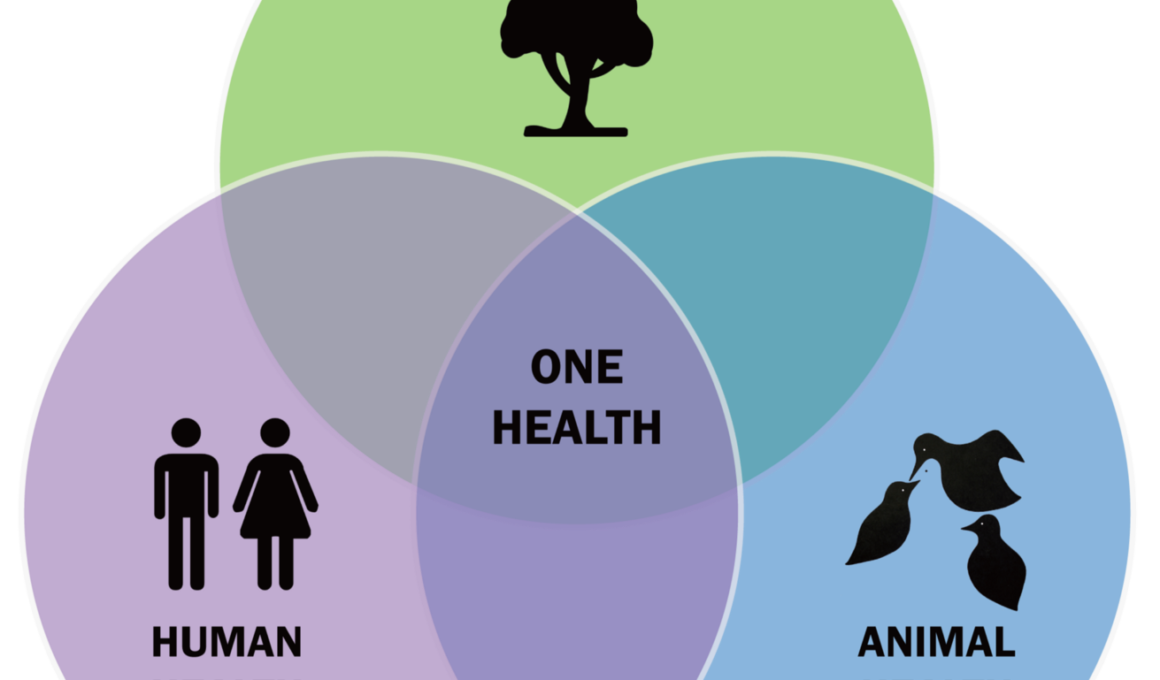institute for health tranformation (InHealth)
Joaquim Cardoso MSc
January 21, 2023
EXECUTIVE SUMMARY
One Health is a concept in global health that recognizes the interconnectedness and interdependence of human, animal, and environmental health.
- The health of humans, animals, and ecosystems are closely linked, and addressing issues at the human-animal-environment interface is crucial for addressing pressing health issues such as (1) pandemics, (2) antimicrobial resistance, (3) food and nutrition insecurity, and (4) climate change.
- A One Health approach involves a shift in perspective, recognizing that all life is equal and of equal concern, and requires a reduction in human pressure on the environment.
- The COVID-19 pandemic highlights the need for a One Health approach and the need for more environmental health organizations to better integrate environmental, wildlife, and farming issues to address disease spillover.
- However, there is a risk of worsening inequalities as One Health networks are largely situated and resourced in high-income countries, and a more egalitarian approach is needed to address this issue.
Take antimicrobial resistance (AMR).
- Driven by antimicrobial use and misuse in human, animal, and environmental sectors, and the spread of resistant bacteria and resistance genes within and between these sectors, AMR inflicts a huge global toll.
- An estimated 1·2 million people died in 2019 from antibiotic-resistant bacterial infections with another 4·95 million deaths associated with bacterial AMR globally.
Only by applying a One Health approach can action to address AMR be achieved.
DEEP DIVE
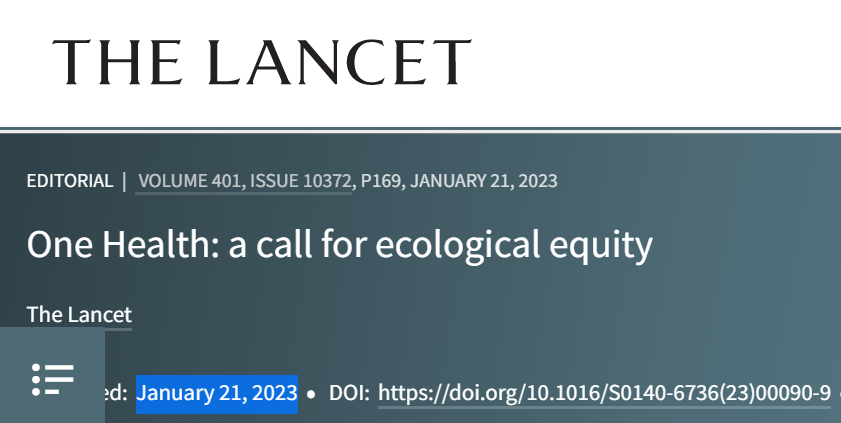
The Lancet
Editorial
January 21, 2023
The notion that the wellbeing of an individual is directly connected to the wellbeing of the land has a long history in Indigenous societies.
Nowadays, the term One Health has become an important concept in global health. The One Health High-Level Expert panel defines One Health as “an integrated, unifying approach that aims to sustainably balance and optimise the health of people, animals, and ecosystems.
It recognises the health of humans, domestic and wild animals, plants, and the wider environment (including ecosystems) are closely linked and inter-dependent.”
On Jan 19, we published a new four-part Series online on One Health and global health security, which analyses current understanding of potential public health emergencies and explores how effective adoption of One Health could improve global health security.
Although the Series focuses on pandemic preparedness, One Health goes way beyond emerging infections and novel pathogens; it is the foundation for understanding and addressing the most existential threats to societies including antimicrobial resistance, food and nutrition insecurity, and climate change.
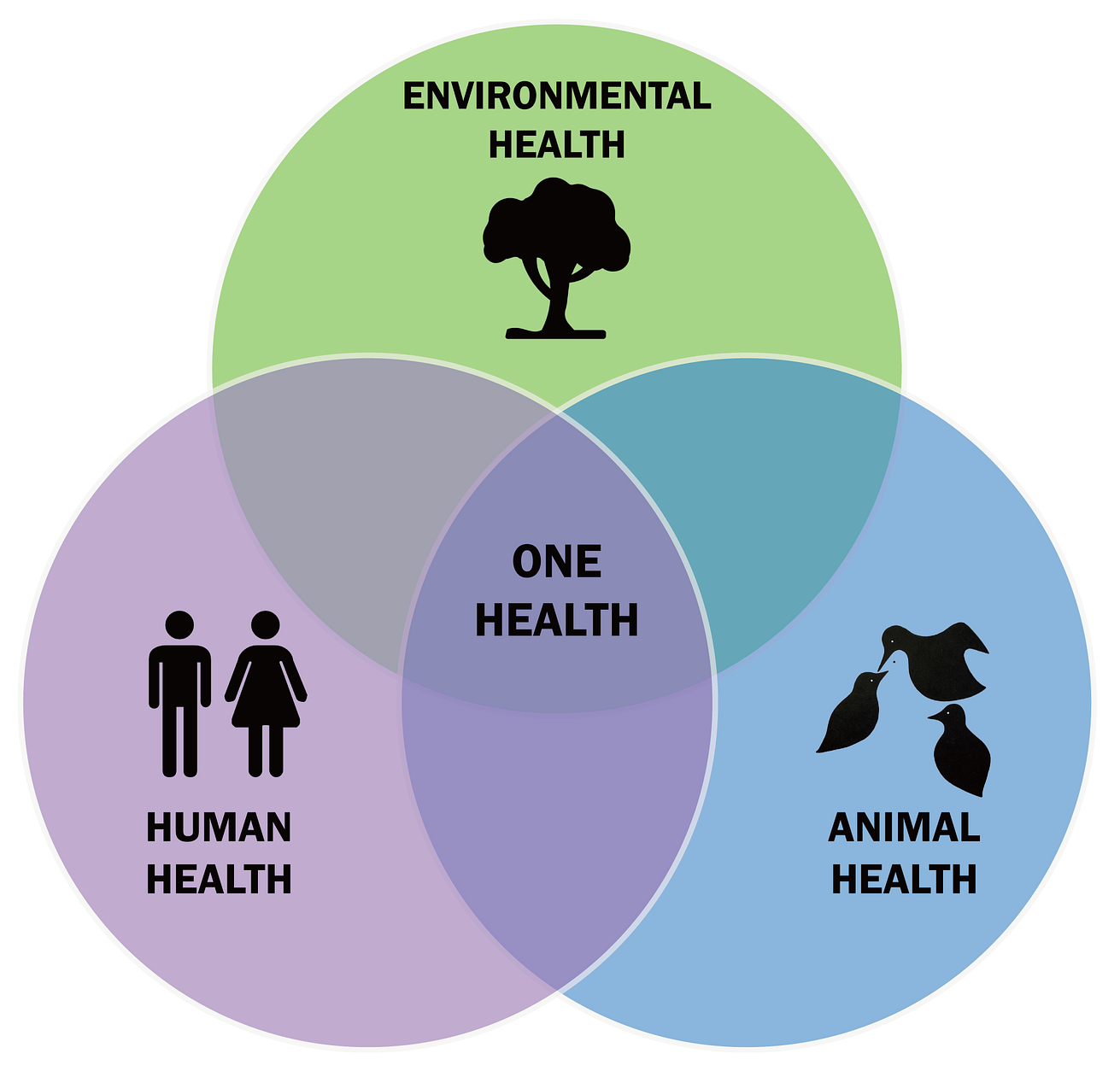
Modern attitudes to human health take a purely anthropocentric view-that the human being is the centre of medical attention and concern.
One Health places us in an interconnected and interdependent relationship with non-human animals and the environment.
The consequences of this thinking entail a subtle but quite revolutionary shift of perspective: all life is equal, and of equal concern.
This understanding is fundamental to addressing pressing health issues at the human-animal-environment interface.
For example, providing a growing global population with healthy diets from sustainable food systems is an urgent unmet need. It requires a complete change to our relationship with animals.
The EAT-Lancet Commission takes an equitable approach by recommending people move away from an animal-based diet to a plant-based one, which not only benefits human health, but also animal health and wellbeing.
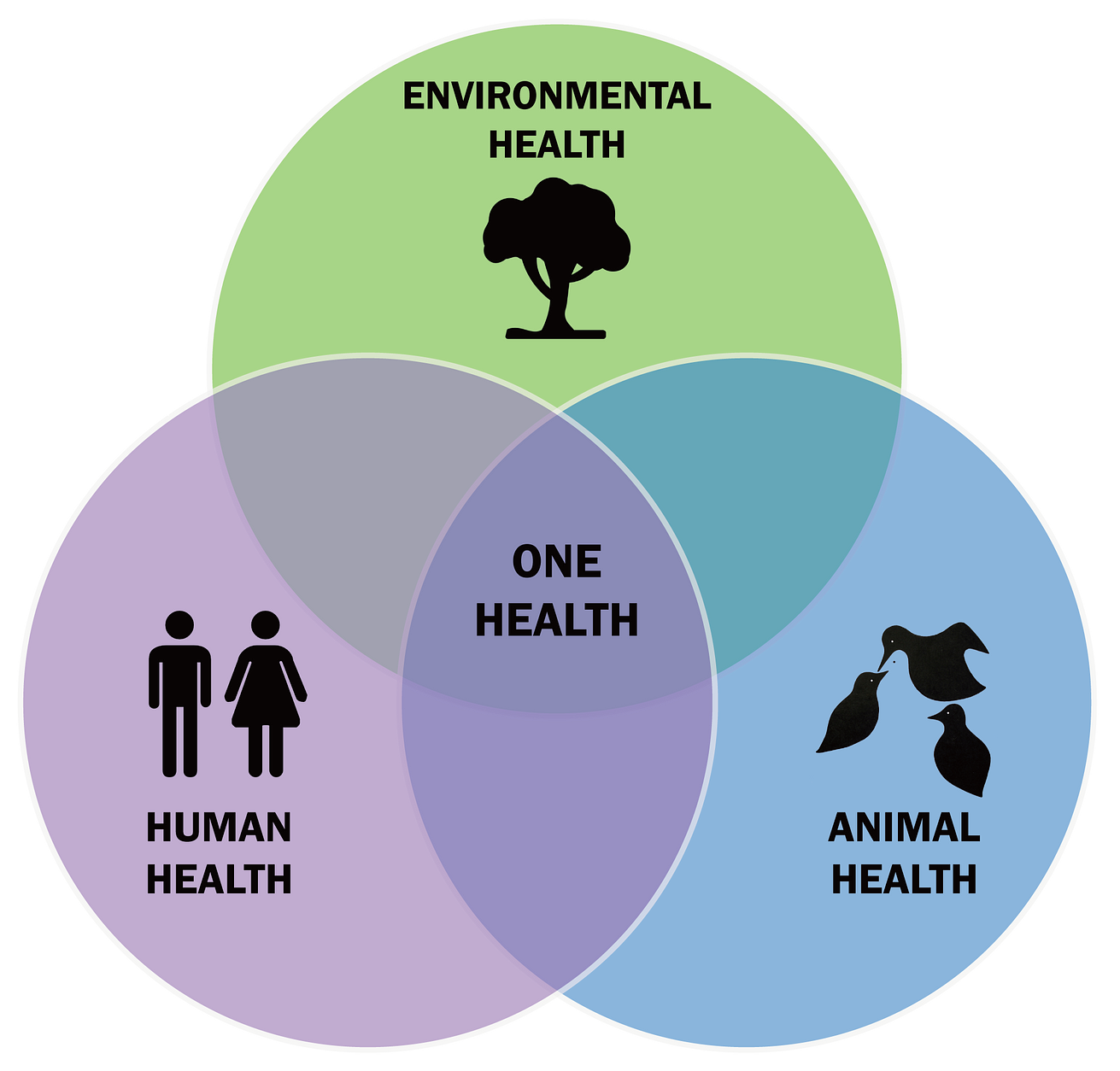
The COVID-19 pandemic provides an important example of the need for a One Health approach.
Analyses of the successes and failures in managing the pandemic have prioritised health systems and the provision of vaccines and antivirals.
But understanding the causes of the pandemic demands a broader ecological perspective.
This lesson has not been fully learned and so we remain susceptible to future lethal emerging infectious diseases.
The Series recommends the involvement of more environmental health organisations to better integrate environmental, wildlife, and farming issues to help address challenges relating to disease spillover.
Analyses of the successes and failures in managing the pandemic have prioritised health systems and the provision of vaccines and antivirals.
The Series recommends the involvement of more environmental health organisations to better integrate environmental, wildlife, and farming issues to help address challenges relating to disease spillover.

One implication of a One Health approach is the need to reduce human pressure on the environment-an important medical intervention in itself.
Take antimicrobial resistance (AMR).
Driven by antimicrobial use and misuse in human, animal, and environmental sectors, and the spread of resistant bacteria and resistance genes within and between these sectors, AMR inflicts a huge global toll.
An estimated 1·2 million people died in 2019 from antibiotic-resistant bacterial infections with another 4·95 million deaths associated with bacterial AMR globally.
Only by applying a One Health approach can action to address AMR be achieved.
An estimated 1·2 million people died in 2019 from antibiotic-resistant bacterial infections with another 4·95 million deaths associated with bacterial AMR globally.
Only by applying a One Health approach can action to address AMR be achieved.

One huge concern is the risk of worsening inequalities as One Health networks are largely situated and resourced in high-income countries.
The current One Health architecture of institutions, processes, regulatory frameworks, and legal instruments has led to a fragmented, multilateral health security landscape.
As the second paper in The Series points out, a more egalitarian approach is needed, one that is not paternalistic or colonial in telling low-income and middle-income countries what they should do.
For example, demanding that wet markets be closed to halt an emerging zoonosis might be technically correct, but if it does not account for those who make their livelihoods from such markets, One Health will only worsen the lives of those it claims to care about.
Decolonisation requires listening to what countries say and what their needs are.
As the global economic crisis continues (The World Bank forecasts a sharp downturn in growth and soaring debt that will hit developing countries the hardest), One Health needs to be implemented sensitively.
The current One Health architecture of institutions, processes, regulatory frameworks, and legal instruments has led to a fragmented, multilateral health security landscape.
The reality is that One Health will be delivered in countries, not by concordats between multilateral organisations, …
… but by taking a fundamentally different approach to the natural world, one in which we are as concerned about the welfare of non-human animals and the environment as we are about humans.
In its truest sense, One Health is a call for ecological, not merely health, equity.
Originally published at https://www.thelancet.com.
APPENDIX
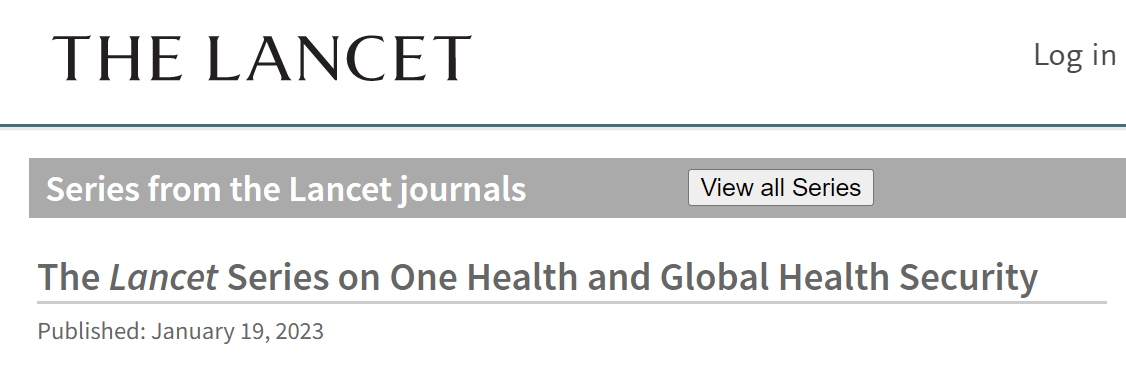
The Lancet Series on One Health and Global Health Security
Published: January 19, 2023
Executive Summary
- Following the 2014–2016 Ebola outbreak in West Africa, and the on-going global COVID-19 pandemic, the One Health approach (bridging the Animal-Environmental-Human Health interface) has rapidly gained political and financial support, …
- …particularly in regional and transcontinental initiatives to improve Global Health Security, including through recently established institutions like Africa CDC and other multidisciplinary consortia.
- This four-paper Lancet Series explores the adoption of One Health approaches to improve health security …
- … and include an analysis of the current landscape of preventive, surveillance, and response measures in outbreak situations of emerging and re-emerging zoonotic infectious diseases with epidemic potential …
- … as well as other potential public health emergencies such as neglected endemic diseases, antimicrobial resistance, environmental and chemical hazards and natural disasters.
Table of Contents
Jakob Zinsstag, Andrea Kaiser-Grolimund, Kathrin Heitz-Tokpa, Rajesh Sreedharan, Juan Lubroth, François Caya, Matthew Stone, Hannah Brown, Bassirou Bonfoh, Emily Dobell, Dilys Morgan, Nusrat Homaira, Richard Kock, Jan Hattendorf, Lisa Crump, Stephanie Mauti, Victor del Rio Vilas, Sohel Saikat, Alimuddin Zumla, David Heymann, Osman Dar, Stéphane de la Rocque
The Lancet, Published: January 19, 2023
Full-Text HTMLPDF
A global analysis of One Health Networks and the proliferation of One Health collaborations
Athman Mwatondo, Afifah Rahman-Shepherd, Lara Hollmann, Scott Chiossi, Josphat Maina, Karishma Krishna Kurup, Osama Ahmed Hassan, Beatrice Coates, Mishal Khan, Julia Spencer, Nyamai Mutono, Samuel M Thumbi, Mathew Muturi, Mumbua Mutunga, Liã Bárbara Arruda, Melika Akhbari, Dena Ettehad, Francine Ntoumi, Terence P Scott, Louis H Nel, Johanne Ellis-Iversen, Ute Wolff Sönksen, Diana Onyango, Zuleka Ismail, Kebadu Simachew, David Wolking, Rudovick Kazwala, Zikankuba Sijali, Bernard Bett, David Heymann, Richard Kock, Alimuddin Zumla, Osman Dar
The Lancet, Published: January 19, 2023, Full-Text HTMLPDF
Tieble Traore, Sarah Shanks, Najmul Haider, Kanza Ahmed, Vageesh Jain, Simon R Rüegg, Ahmed Razavi, Richard Kock, Ngozi Erondu, Afifah Rahman-Shepherd, Alexei Yavlinsky, Leonard Mboera, Danny Asogun, Timothy D McHugh, Linzy Elton, Oyeronke Oyebanji, Oyeladun Okunromade, Rashid Ansumana, Mamoudou Harouna Djingarey, Yahaya Ali Ahmed, Amadou Bailo Diallo, Thierno Balde, Ambrose Talisuna, Francine Ntoumi, Alimuddin Zumla, David Heymann, Ibrahima Socé Fall, Osman Dar
The Lancet, Published: January 19, 2023, Full-Text HTMLPDF
Global and regional governance of One Health and implications for global health security
Azza Elnaiem, Olaa Mohamed-Ahmed, Alimuddin Zumla, Jeffrey Mecaskey, Nora Charron, Mahamat Fayiz Abakar, Tajudeen Raji, Ammad Bahalim, Logan Manikam, Omar Risk, Ebere Okereke, Neil Squires, John Nkengasong, Simon R Rüegg, Muzamil M Abdel Hamid, Abdinasir Y Osman, Nathan Kapata, Robyn Alders, David L Heymann, Richard Kock, Osman Dar
The Lancet, Published: January 19, 2023, Full-Text HTMLPDF




